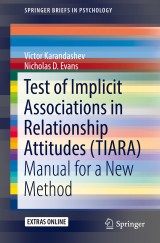Details

Test of Implicit Associations in Relationship Attitudes (TIARA)
Manual for a New MethodSpringerBriefs in Psychology
|
CHF 59.00 |
|
| Verlag: | Springer |
| Format: | |
| Veröffentl.: | 29.11.2017 |
| ISBN/EAN: | 9783319687681 |
| Sprache: | englisch |
Dieses eBook enthält ein Wasserzeichen.
Beschreibungen
<p>This volume presents a manual for a new method of studying implicit attitudes, the Test of Implicit Associations in Relationship Attitudes (TIARA). The main goal of this volume is to demonstrate how to study the implicit attitudes that people have toward others in their close relationships: friend, romantic partner, family member, etc. Since the inception of the concept and measures of implicit cognition, researchers have developed a number of indirect measures to assess implicit attitudes. These similar yet different methods aim to account for different variables for reliable and valid operational definitions of implicit attitudes. Given the progress made in the field of implicit measures, there is great potential for further development and extension of these types of assessments. Many of these methods (especially the Implicit Attitude Test) are only limited to assessing attitudes within the comparison of two bipolar concepts. Therefore, TIARA was developed to be a manual for anew method of studying implicit attitudes in relationships. </p><p></p><p>As described in this volume, TIARA shows that if a person strongly believes that certain feelings can be attributed to a target relationship figure, the reaction time is shorter since they are the most confident in their answer. Beginning with a grounded explanation of the theory behind TIARA, the volume then proceeds to explain its methods and procedures, and how to code, score, and interpret the results of TIARA. Next, the volume reports on six psychometric studies, which provide substantial evidence that TIARA is a valid and reliable measure to study implicit attitudes in relationship research. The volume concludes by exploring practical applications of TIARA as well as its future directions and current limitations. The detailed description of the TIARA method provides a practical and handy tutorial for using the method in research and practice for social and personality psychologists, as well as practitioners.</p>
1. Theoretical Foundation of TIARA.- 2. Preparation and Administration of TIARA.- 3. TIARA Coding and Scoring: Instructions for Data Transformation and Analysis.- 4. Interpersonal Reliability and Validity of TIARA: Analysis of Results across All Participants<b>.- </b>5.<b> </b>Intrapersonal Reliability and Validity of TIARA: Analysis of Individual Cases .- 6. Practical Applications, Limitations, and Prospective Research Using TIARA.
<p><b>Dr. Victor Karandashev</b> is an international scholar with experience of cross-cultural love research in several European countries and the United States of America. Currently he is on the faculty of Aquinas College in Grand Rapids, Michigan. As a social psychologist, he studied romantic relationships and reported his love research in several publications, including his recent book <i>Romantic love in cultural contexts </i>(2017)<i>. </i>He regularly convenes symposia and present on this topic at international conferences.</p> <p><b>Nicholas Evans</b>is an Aquinas College graduate, who gained extensive research experience using implicit association methods in close relationship research. Currently he is a doctoral student at the University of Texas at El Paso and continues to be involved in love research. </p>
<p>This volume presents a manual for a new method of studying implicit attitudes, the Test of Implicit Associations in Relationship Attitudes (TIARA). The main goal of this volume is to demonstrate how to study the implicit attitudes that people have toward others in their close relationships: friend, romantic partner, family member, etc. Since the inception of the concept and measures of implicit cognition, researchers have developed a number of indirect measures to assess implicit attitudes. These similar yet different methods aim to account for different variables for reliable and valid operational definitions of implicit attitudes. Given the progress made in the field of implicit measures, there is great potential for further development and extension of these types of assessments. Many of these methods (especially the Implicit Attitude Test) are only limited to assessing attitudes within the comparison of two bipolar concepts. Therefore, TIARA was developed to be a manual for anew method of studying implicit attitudes in relationships. </p><p></p><p>As described in this volume, TIARA shows that if a person strongly believes that certain feelings can be attributed to a target relationship figure, the reaction time is shorter since they are the most confident in their answer. Beginning with a grounded explanation of the theory behind TIARA, the volume then proceeds to explain its methods and procedures, and how to code, score, and interpret the results of TIARA. Next, the volume reports on six psychometric studies, which provide substantial evidence that TIARA is a valid and reliable measure to study implicit attitudes in relationship research. The volume concludes by exploring practical applications of TIARA as well as its future directions and current limitations. The detailed description of the TIARA method provides a practical and handy tutorial for using the method in research and practice for social and personality psychologists, as well as practitioners. </p><div><br/></div>
Offers a new advancement in the development of implicit methods to study relationship attitudes Presents evidence of validity and reliability of a new method for implicit association research Describes a single case analysis that is interesting and useful for counselors and other practitioners Provides a practical and handy tutorial for using the method in research and practice
Offers a new advancement in the development of implicit methods to study relationship attitudes<div>Provides a single case analysis that is interesting and useful for counselors and other practitioners</div><div>Presents a practical and handy tutorial for using the method in research and practice</div><p></p>

















